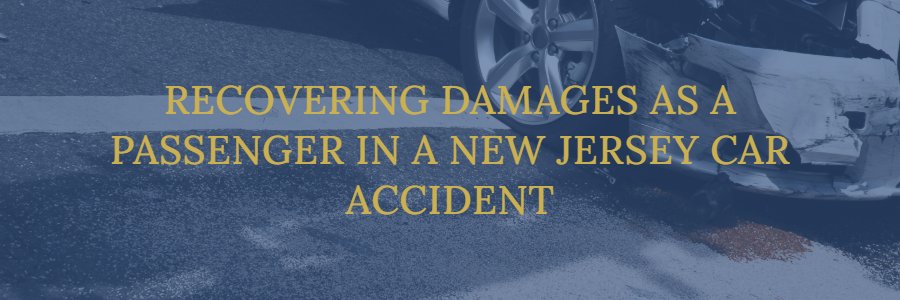Recovering Compensation as a Passenger in a Car Accident in New Jersey
If you get into a car accident as a vehicle passenger, you have legal rights and options for collecting financial compensation. In general, the legal process is simpler for an injured passenger than a motor vehicle driver, as a passenger does not have to deal with allegations of fault for the collision. Use the following information to recover compensation as an injured passenger in a car accident case in New Jersey.
Whose Insurance Pays for My Injuries as a Passenger?
With some exceptions, the car insurance policy that you will use to obtain financial compensation as an injured passenger is that of the person who was driving the vehicle that you were in. The driver of your vehicle automatically assumed financial responsibility (liability) for your injuries and losses in an accident when he or she took you as a passenger. Whether or not the driver caused your accident, it is his or her car insurance company that you will contact for benefits after a car accident in New Jersey.
When Can I Hold the Other Driver Responsible?
As an injured passenger in a car accident, you are eligible for financial compensation regardless of who caused the crash. In New Jersey, a no-fault law applies to car accident cases. This law states that regardless of fault, injured drivers will seek coverage from their own insurers. As an injured passenger, you will file a claim under your driver’s no-fault/personal injury protection insurance policy. You may have grounds to file a claim against the other driver, however, if your injuries meet New Jersey’s serious injury threshold:
- Broken bones
- Significant scarring or disfigurement
- A permanent injury with a degree of medical probability
- The loss of a limb
- The loss of a fetus
In one of these scenarios, you will have legal recourse against the other driver for your injuries and medical bills. A third-party claim could result in greater financial compensation for your losses than a no-fault insurance claim. If you are not sure whether you have grounds to file a claim against the other driver, consult with a car accident attorney who can investigate and explore your rights. If both drivers share fault, you may be able to recover from both policies.

Should I Keep My Claim Separate if the Driver Was a Family Member?
Car accident cases involving injured passengers who are family members of the driver, such as a husband and wife, may decide to either combine their claims or keep them separate. In this situation, it is important to seek advice from a lawyer before proceeding. It may be in your family’s best interest to keep the driver and passenger’s claims separate for insurance purposes.
What if the Driver Doesn’t Have Enough Insurance?
If you find out that the driver of the vehicle is uninsured, underinsured, or simply does not have enough insurance to fully pay for your medical bills and other losses, you will have the right to hold the other driver’s insurance company accountable, as well. The other driver’s insurer can provide supplemental coverage for you as a passenger, regardless of which driver caused the crash.
Should I File a Claim Against the Driver of the Car I Was In?
It may be in your best interests to file a personal injury lawsuit against the driver of the car that you were in if you suffered serious or catastrophic injuries. A lawsuit can result in greater financial compensation for a severe injury than an insurance claim. You could be paid for your pain and suffering with a personal injury lawsuit, for example, as well as loss of consortium. In addition, you may have no choice but to file a claim against the driver if his or her insurance company wrongfully rejects your claim.
For more information about your legal options as a passenger in a recent car accident, contact an attorney at The Law Offices of Jeffrey S. Hasson, P.C. for a free consultation.
